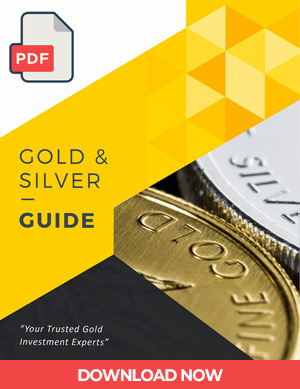As Virus Stirs Panic, Financial Doomsday Scenario Looms – Are YOU Prepared?
 Bullion.Directory precious metals analysis 10 March, 2020
Bullion.Directory precious metals analysis 10 March, 2020
By Stefan Gleason
President of Money Metals Exchange
We appear to be entering the sort of scenario that doomsday preppers have been warning about for years. A pandemic is spreading death and panic around the world. Markets are crashing. Store shelves are emptying…
How long will it be before the economy grinds to a halt completely? How long will it be before the heavily leveraged financial system simply freezes up?
Emergency rate cuts by the Federal Reserve won’t necessarily keep the banks open. Central bankers won’t necessarily keep grocery stores supplied with food. And they won’t necessarily help you and your family survive the present crisis.
We don’t know if the worst is behind us or yet to come.
The point of preparedness isn’t to try to predict when a crisis will hit or how long it will last. The point is to always be ready for a worst-case scenario.
Why Bank Runs Occur
You don’t want to be among those lined up outside of a big box store hoping to fight your way to the last remaining inventories of toilet paper. Yes, frantic, sometimes combative bathroom tissue runs are now occurring across many parts of the world as panic buying sets in.
As Australian economist Alfredo R. Paloyo explains, “This panic buying is the result of the fear of missing out. It’s a phenomenon of consumer behaviour similar to what happens when there is a run on banks.
“A bank run occurs when depositors of a bank withdraw cash because they believe it might collapse. What we’re seeing now is a toilet-paper run.”
If social panic spreads and escalates, bank runs and closures will be a likely consequence. It’s driven by the same mass psychology that is now clearing store shelves.
Have a Personal Financial Plan B in Place
In our online, digital age, few people have any backup plan for when the financial system fails. The few bucks you likely carry in your wallet won’t get you far or last long.
Just as you should have emergency reserves of household essentials – bottles of water, non-perishable foods, necessary medications, disinfectant wipes, surgical masks, first aid kits, batteries, ammunition, and yes, toilet paper – you also need emergency reserves of cash.
Keep a few hundred dollars in $20 bills (since they are most widely accepted) somewhere hidden and safe in your home.
Of course, paper cash is a poor long-term store of value. And someday it may even be abolished and replaced with digital dollars.
Paper Cash Can Literally Spread Sickness
The World Health Organization (WHO) is using the coronavirus crisis as an opportunity to promote cashless technology. The WHO says banknotes may be spreading the virus and recommends people use contactless payments instead.
It’s true that paper cash is often riddled with infectious germs. During times like these, it’s especially important to wash your hands after handling cash.
A good scrubbing with plain soap and water will destroy and remove viruses including Covid-19, medical experts say. Hand sanitizer isn’t necessary unless you’re on the go and can’t get to a sink.
Unfortunately, the U.S. many decades abandoned a sounder and far sound more sanitary form of cash: silver coins.
Whereas dangerous pathogens can survive on paper notes for long periods, viruses and bacteria are naturally repelled by silver. In fact, silver’s antimicrobial properties are so impressive that many hospitals use silver-derived materials help inhibit the spread of infection.
How to Build a Sound Money Stash
While 90% silver dimes, quarters, and half-dollars may no longer be minted, they can still (for now) easily be obtained in the secondary market from bullion dealers – and for little to no premium above other common silver bullion products.
These historic pre-1965 silver coins are an essential part of any overall emergency preparedness strategy. Their relatively small denominations and widely recognized features make them ideal for use as money.
Of course, their silver content will make them worth far more than their face value in barter situations.
At silver spot prices as of this writing, a pre-1965 dime has an intrinsic metal value of $1.27. A silver quarter is worth $3.18. A silver half-dollar is equivalent to $6.35. And a Morgan or Peace silver dollar is worth an estimated $13.58 (though these coins will tend to command additional collectible premiums depending on their condition).
In addition to an emergency silver stash made up of a good variety of denominations, you will also want to add some gold for storing larger amounts of wealth/engaging in larger transactions.
You can round out your emergency money metals stash with some copper bullion rounds or copper pennies minted in 1982 or earlier. That way, you’ll never have to part with more silver or gold than you need to in order to complete a transaction.
Even if you think the chances are small that you’d ever need to use precious metals for barter, there’s no harm in acquiring the ability to do so. You’ll have some hard assets to your name that will offer long-term inflation protection. Your metals can also be sold into a highly liquid market for dollars whenever you want to ring the register.
In the meantime, being prepared for financial turmoil will give you peace of mind. You’ll feel more confident and rest easier knowing that you have a Plan B in place.
This article was originally published here Bullion.Directory or anyone involved with Bullion.Directory will not accept any liability for loss or damage as a result of reliance on the information including data, quotes, charts and buy/sell signals contained within this website. Please be fully informed regarding the risks and costs associated with trading in precious metals. Bullion.Directory advises you to always consult with a qualified and registered specialist advisor before investing in precious metals.










 Material provided on the Bullion.Directory website is strictly for informational purposes only. The content is developed from sources believed to be providing accurate information. No information on this website is intended as investment, tax or legal advice and must not be relied upon as such. Please consult legal or tax professionals for specific information regarding your individual situation. Precious metals carry risk and investors requiring advice should always consult a properly qualified advisor. Bullion.Directory, it's staff or affiliates do not accept any liability for loss, damages, or loss of profit resulting from readers investment decisions.
Material provided on the Bullion.Directory website is strictly for informational purposes only. The content is developed from sources believed to be providing accurate information. No information on this website is intended as investment, tax or legal advice and must not be relied upon as such. Please consult legal or tax professionals for specific information regarding your individual situation. Precious metals carry risk and investors requiring advice should always consult a properly qualified advisor. Bullion.Directory, it's staff or affiliates do not accept any liability for loss, damages, or loss of profit resulting from readers investment decisions.

Leave a Reply